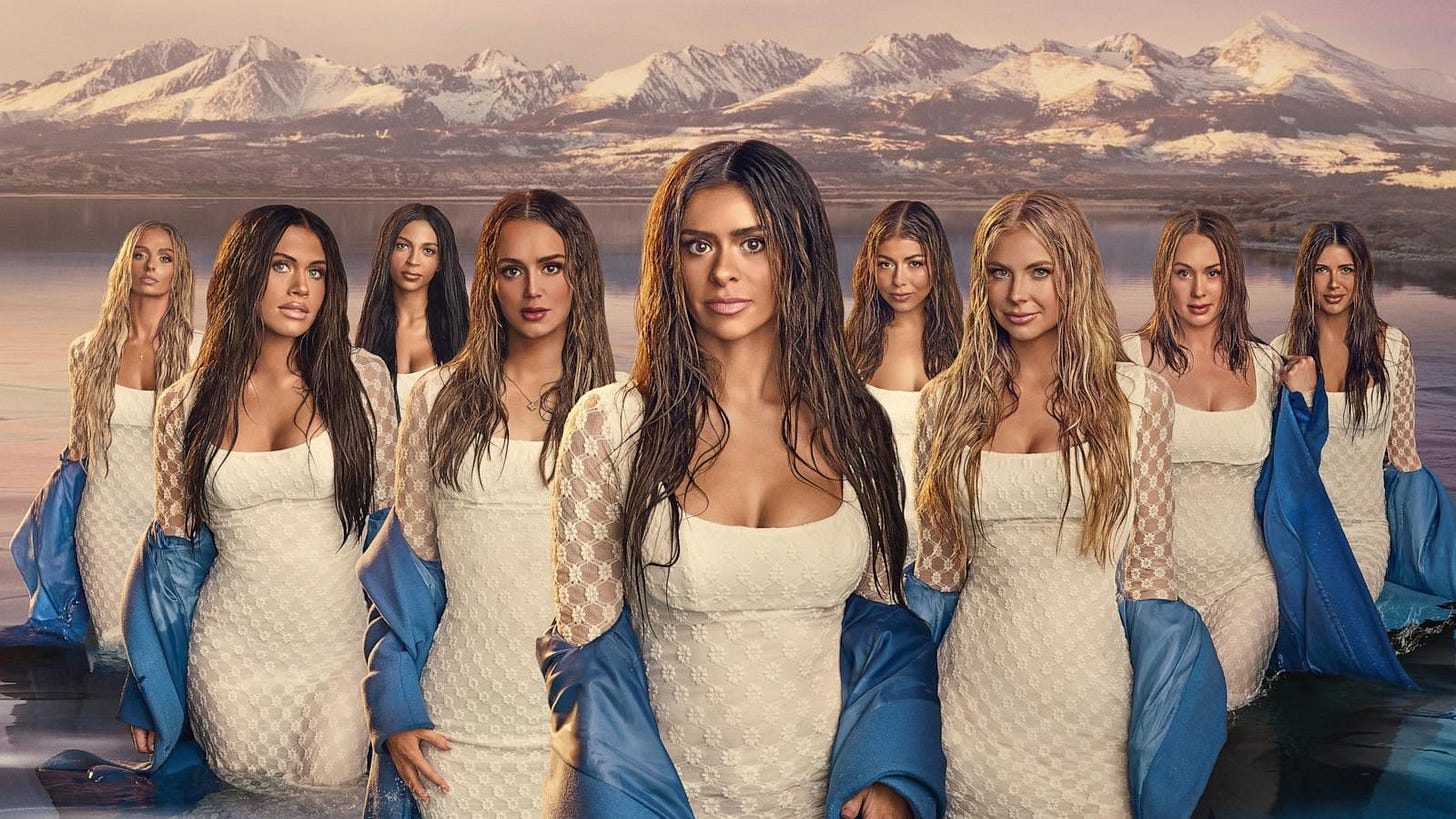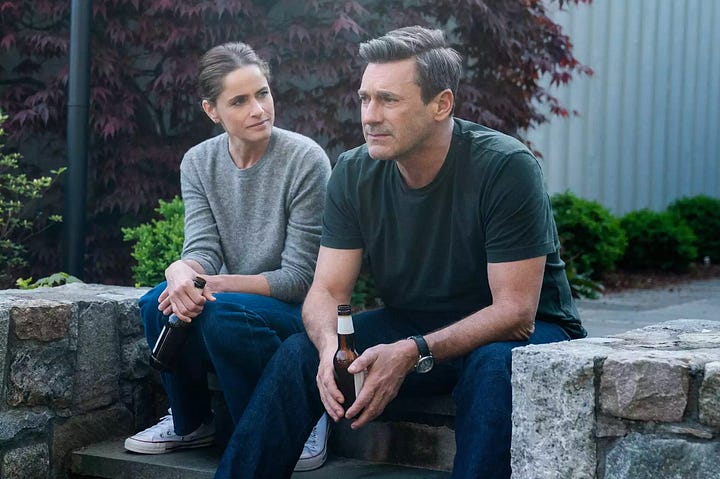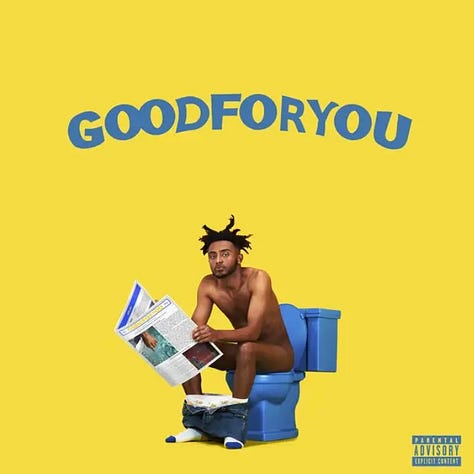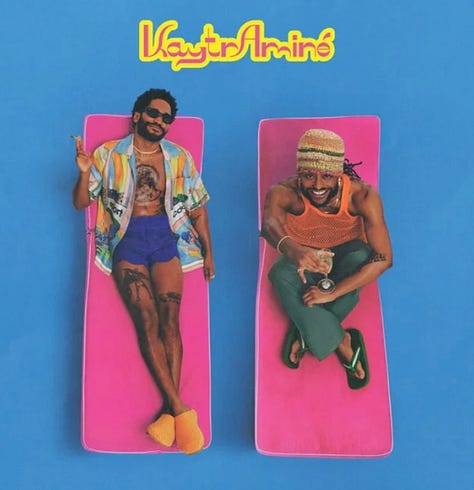Cultural Reset #2
The girls talk "The Secret Lives of Mormon Wives," "Friends and Neighbors," "The Rehearsal," and Aminé.
Welcome to the Cultural Reset — a monthly series where we dive a little deeper into the world of books, TV, music, film, and more! Think of it as our usual “Hunter gatherer corner,” but extended. Let’s get into it!
This Is The Real Holy War

The Secret Lives of Mormon Wives is one of the most unpredictable reality shows I’ve ever seen. It follows a group of Mormon influencers who create content together under the group name “MomTok,” but this description fails to do the storyline justice. Within the first half hour of the first episode, we watch Taylor Frankie Paul — a bonafide reality star who’s honest to a fault — publicly come out as a “soft swinger,” reveal a miscarriage, get arrested for a domestic disturbance, and then get pregnant again by a man named Dakota. The throughline of the season is tied to the rest of the cast’s reluctance to accept her back into the fold; to be her friend is to be a bad Mormon.
Luckily, by season 2, the cast all realized that the money from the show is worth any pushback. This begets another Holy War: Who is worthy of a piece of Paul’s pie? In the 10 episodes released so far, we first see the women at odds with Miranda McWhorter, a former MomToker (and swinger) who ditched Paul following the scandal, but asks to rejoin the group in season 2. She claims she is in search of friendship, but the other wives clock that the timing is “convenient.” The fame hydra grows another head when Demi Engemann, an OG from season 1, begins openly vying to be MomTok’s new leader. Engemann’s argument is that Paul is unpredictable and it messes with their brand deals. Paul, and many of the other women, are put off by her blatant striving. The nature of “slice of life” reality programming like Mormon Wives or its spiritual predecessor Real Housewives is that, eventually, the storylines stop being about the cast’s lives outside of the show and devolve into fights about the meta. It’s understandable — why talk about your impending divorce or financial issues when you can talk about your coworkers’ missteps? Usually, this is done with intentionally obfuscated speech. (If you hear a housewife complain about not being invited by another housewife on a trip, that’s code for: You are taking away my screen time and cutting up my paycheck.)
In one argument this season, Paul shocks the other women with the information that Engemann asked the production to remove her bestie Jessi Ngatikaura from the show in order to get herself a bigger contract. Later, it’s revealed that Engemann has voiced that she should be getting the biggest brand deals, given that she is a “fan favorite.” Paul snaps back: If the entire show is predicated on her vulnerability, shouldn’t she be getting the biggest brand deals — and shouldn’t everyone be thanking her for her willingness to make the rest of them famous off of the ugly parts of her life? The most recent episode ends with a “board meeting,” where every cast member votes on who gets to film TikTok videos with MomTok (and, subsequently, make the most money off the show). McWhorter doesn’t make the cut this time. As for the leader? Technically, they say they don’t have one, but Paul seems pretty comfortable at the top. — LM
Apple TV+ would also like to fellate Jon Hamm


You shouldn’t judge a book by its cover, but is it fair game to judge a show by its opening monologue? From the get-go, I was skeptical of Friends and Neighbors, as I am of anything that runs on Apple TV+ at this point (Severance and Ted Lasso fans…..you are under SPELLS people!). The premise was fun enough: Jon Hamm starts burglarizing the homes of his, well, friends and neighbors, to keep his grip on mass amounts of wealth and social access in the aftermath of his divorce and getting laid off from his shiny corporate corner office role.
The problem is that everything about the shows feels stale. The jokes don’t make me laugh. The acting is canned, the scenes of McMansions and life in the ritzy community he lives and steals in aren’t more visually interesting than the average car or insurance commercial. Everything relies on Jon Hamm, but this is community theater compared to a role like Don Draper. In a painstakingly long opening scene, Hamm’s Andrew “Coop” Cooper sits at a bar and picks up a woman who leads to the loss of his job. It drags on and on, with Hamm acting suave and sarcastic as the writers salivate at their own wit, which is lackluster and bored me to the point of actual irritability. Without the quirks of other upper class critiques like White Lotus or the riveting dialogue of Succession, all this series has shown thus far is that Apple has deep pockets and a God complex, an expensive ego fed by the very real life people the show claims to be mocking. —MF
Bad Dress Rehearsal, Good Opening Night?

This season of The Rehearsal, an HBO show by comedian Nathan Fielder that’s part documentary / part reality TV / and part absurdist prank show, follows Fielder’s obsession with commercial airplane crashes. He believes they are often caused by communication issues between pilots in the cockpit, especially in situations where the First Officer is afraid to question the Captain. In classic Fielder fashion, the plot takes a lot of unexpected turns. He stages a fake reality singing competition called “Wings of Voice” where First Officers are the judges, in an attempt to help them learn how to deliver bad news. He encourages an actor to date a First Officer whose confidence he is helping to build. He pretends to be legendary pilot Sully Sullenberger, reenacting moments in his life all the way from birth to his historic plane landing on the Hudson River in 2009.
As with all Fielder productions, the ethical lines are blurred, mostly to hilarious effect (though in the case of this season, he reiterates often, everything done is for the greater good of aviation safety). Mid-season, one of the participants of Wings of Voice came out saying that she felt scammed and duped by the production, since it was never a real competition show. A lot of the conversation around Fielder’s work — stemming back to his Comedy Central cult classic Nathan For You, where he gives businesses ridiculous advice that he makes them follow to completion — is about what is actually real or not. Why would a real business agree to serve an accurately poop-flavored yogurt? Why would a woman, unprompted, say she had a wet dream about Einstein on television? And, perhaps, the most important question of this season: Why would over a hundred actors agree to board a Boeing 737 piloted by Fielder, who had less than 300 hours as a pilot, who would be flying a plane of that size (and a plane of passengers) for the first time in his life, and who was only licensed to fly a plane of that size based on a technical loophole?
Skeptics default to the idea that it’s not really real, that these are all elaborate stunts and actors and effects and NDAs. Maybe that is the case, though Fielder attempts to showcase the behind-the-scenes work as much as possible to telegraph verisimilitude. Think: Crews building sets, actors eating at craft services, Fielder himself taking notes throughout production on a laptop strapped to his chest. (It’s a trick often employed by reality TV shows during highly dramatic moments: “Look how real we’re being here! We’re even showing you the cameraman!”) Die-hard fans will tell you it’s all real. Pilot licenses are public record, and Fielder’s checks out. I honestly think it doesn’t matter either way. Like all reality shows (and though some annoying men may argue that Fielder’s work is a more highbrow genre, it is reality TV), plenty will be staged. Producers are literally paid to make sure the most dramatic or (in Fielder’s case) wacky moments are caught on camera. But the reactions they elicit are real, even if provoked. The stakes of this season, which I reiterate ends with a comedian becoming a commercial airline pilot, are real. Even Wings of Voice is real. I mean, the winner performed on an HBO show. The final message — that airline travel isn’t as safe as we think, largely because pilots are pressured to lie about their mental and emotional state to continue flying — is chillingly real even without all the movie magic. Maybe it just helps us take the edge off a little. He is a comedian, after all. — LM
Aminé is always on a vacanza



In the last 5 years, Aminé has released a smattering of projects: the aptly-named 2020 album Limbo, a mixtape, some EPs, a few features, and a dancey, collaborative album with Kaytranada. Despite maintaining a kind of quiet industry omnipresence, and the relative critical finesse of that KAYTRAMINÉ release, none of it really made an impact on me (or the charts, for that matter). Aminé tends to stay within his station, and only a few of his songs have broken through the streaming behemoth that’s strangulated more and more artists since the advent of his career. Regardless, as an original stan who attended college in the days of his explosive single “Caroline,” I’ve happily listened to all of his work. Yet, I have never felt motivated to return to much of it after his debut album Good For You, with the exception of certain addictive tracks like “REEL IT IN” or “Compensating.” Perhaps this was a result of my prefrontal cortex developing, or the soundtrackless fog of the Covid years, but I figured Aminé had lost some of that spark that had drawn me in as a 19-year old — even as he began to sound more sure of his direction rap-wise, more interested in experimentation with genres like hyperpop and less in the commercial sound he had leaned on originally.
His latest release, 13 Months of Sunshine, came as a pleasant surprise. Introspective without inducing any prerequisite eye rolling that usually comes with such territory, it’s his best storytelling yet. Interspersed with little audio interviews with his father, the album is a celebration of his Ethiopian roots (hence the album title) with African influence in the production. It’s still true to Aminé — bright, summery music for vibing, but gets refreshingly personal. “I Think It’s You” is an inner monologue of regret and self-doubt: “Don’t know what’s wrong with me / I’ve been letting all my problems get to me,” he sings softly. My favorite track might be “History,” featuring Waxahatchee, about a waxing and waning great love. A picturesque track that begs for a moody music video, Aminé croons: “Searching through the sheets in bed while the sun seeps / Right through your eyes I see / you’re in love with me but that don’t mean you still gotta like me too.” “Vacay” is a spacey, twinkly, bouncy autotune anthem for your summer plans, depicting boutique hotels, plush robes, and spritzes. When Aminé raps “I’m on my Dua Lipa,” I can’t wait until I am, too. —MF
If you liked this issue, you are our true friend and neighbor! Tell us your thoughts in the comments or on Instagram (@tiw.newsletter | @lilly_milman | @melindafakuade), and share it with the person you’d co-pilot a 737 with.






